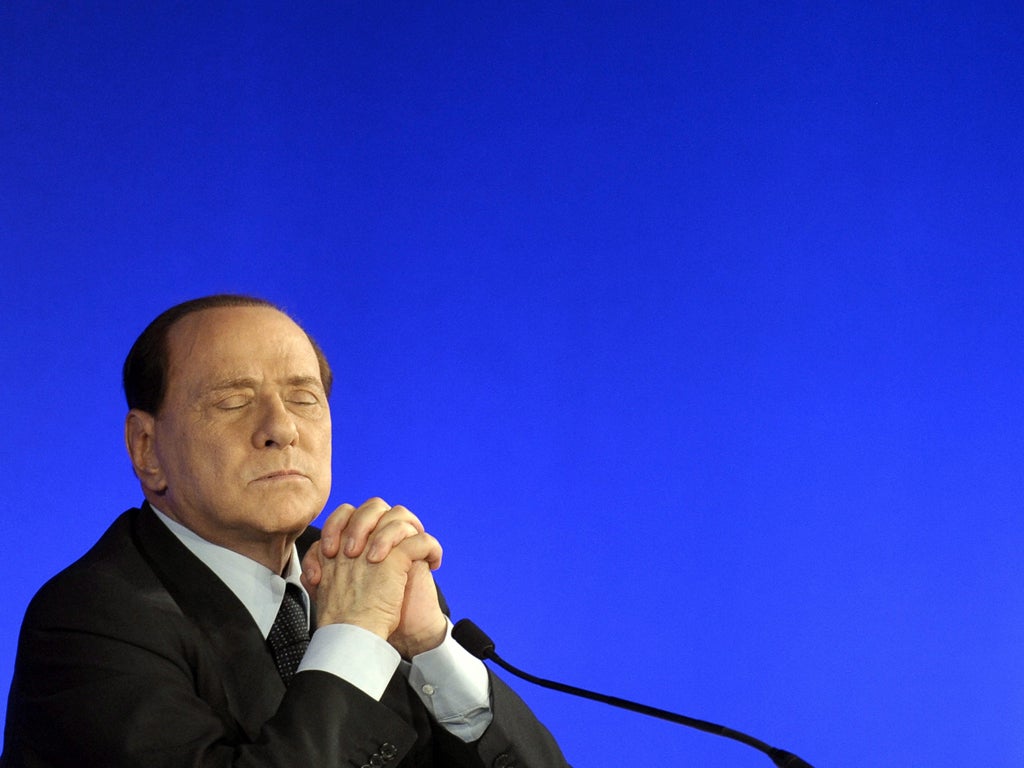
Your support helps us to tell the story
From reproductive rights to climate change to Big Tech, The Independent is on the ground when the story is developing. Whether it's investigating the financials of Elon Musk's pro-Trump PAC or producing our latest documentary, 'The A Word', which shines a light on the American women fighting for reproductive rights, we know how important it is to parse out the facts from the messaging.
At such a critical moment in US history, we need reporters on the ground. Your donation allows us to keep sending journalists to speak to both sides of the story.
The Independent is trusted by Americans across the entire political spectrum. And unlike many other quality news outlets, we choose not to lock Americans out of our reporting and analysis with paywalls. We believe quality journalism should be available to everyone, paid for by those who can afford it.
Your support makes all the difference.The sense of disarray in the government of Silvio Berlusconi deepened last night, as it sought to downplay the humiliation of having International Monetary Fund (IMF) inspectors police vital economic reforms, while the supposedly neutral head of state, Giorgio Napolitano, warned that Italy was facing an "unprecedented crisis".
But the death throes of Mr Berlusconi's premiership have ramifications far beyond Italian boarders, and world powers led by Germany, France and the US, effectively imposed IMF checks on Italy's reforms in the hope of stopping it going the way of Greece – and dragging the euro with it. "Italy has decided on its own initiative to ask the IMF to monitor its commitments," said EU President José Manuel Barroso, announcing the news as diplomatically as he could, at the Cannes G20 summit yesterday.
IMF head Christine Lagarde announced later in the day that her monitors would arrive in Italy before the end of the month. She did not elaborate on reports in some Italian newspapers that the IMF might offer Italy €44bn (£37.8bn) of emergency credit.
Italy has promised to cut its €1.8tr public debt and kickstart its economy by reforming labour markets and pensions, and selling off state assets. Doubts remain, however, over the tottering Berlusconi administration's ability to stick to its pledges.
Any notion that Italy had invited IMF monitors – or even accepted them willingly – was dispelled by forlorn protests issued by Italian government sources just before the Barroso statement, claiming that Italy would not accept any monitoring of its economic reforms.
Political observers were predicting last night that the IMF's direct intervention would hasten Mr Berlusconi's exit from power.
Franco Panvoncello, a political science professor at Rome's John Cabot University, said: "Until now, everyone's been asking whether it's a good thing to get rid of Berlusconi in the middle of this financial crisis, even though he's a liability.
"But now I believe the road ahead may have been laid by the IMF intervention. Italy is effectively coming under outside control. And by putting Italy on probation, any Italian government that's in power knows that it has to press through these reforms. That's why rebels now feel they can leave Berlusconi's PDL party... the government might only last a matter of days."
Join our commenting forum
Join thought-provoking conversations, follow other Independent readers and see their replies
Comments